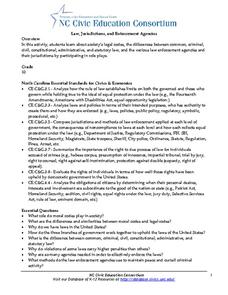Curated OER
The Movement Before the Movement: Civil Rights Activism in the 1940s
Many educators focus on the civil rights movement as it occurred after Rosa Parks incited the bus boycott. Extend the understanding of the fight for civil rights in the United States with this post-WWII lesson. Learners examine and...
School Improvement in Maryland
Court Proceedings Civil Cases
What's the difference between civil and criminal law? How do the court proceedings differ in these two types of trials? How do the standards of proof differ? Why do these differences exist? As part of their examination of the US court...
Carolina K-12
Law, Jurisdictions, and Enforcement Agencies
How do you determine what law enforcement agency has jurisdiction when a crime has been committed? That's the challenge facing class members in this role-play activity.
Curated OER
Laws...Who Needs Them?
Who needs laws? Junior high schoolers sure do! Provide your 7th-9th graders with an understandng about why laws are important and how they are used to create a functioning society. Learners use a series of handouts and readings to build...
Personal Genetics Education Project
DNA, Crime and Law Enforcement
Civil rights meets biotechnology in a instructional activity that scrutinizes the collection of DNA of citizens who have been arrested, but not yet convicted of a crime. Real-life cases are examined in which the DNA of a relative was...
iCivics
The Road to Civil Rights
Here is a fantastic resource on the civil rights movement! It includes reading materials and worksheets, and particularly highlights major legislation and the role of the judicial branch in the federal government in addressing the...
Facing History and Ourselves
Laws and the National Community
When it comes to the law, is justice always served? Teach scholars about how law sometimes enables prejudice of entire groups of people with a unit on World War II that includes a warm-up activity, analysis of primary sources,...
Curated OER
Lesson 4: The Judiciary: A Brief Introduction to the Courts System
Focusing on the judicial branch of government, the fourth lesson in this series explores the structure of the US courts system. Beginning with an engaging activity based on the short story The Lady or the Tiger, students go on to examine...
Wisconsin Historical Society
Civil Disobedience
When is civil disobedience acceptable? Class members read examples of Jim Crow laws, an excerpt from Dr. Martin Luther King's "Letter from a Birmingham Jail," and a newspaper article and then consider the factors that make a law just or...
City University of New York
Jim Crow and the Fight for Civil Rights
The history of voting rights in America has always been rocky, especially in the time period after the Civil War. Learn about the ways that Jim Crow laws affected the voting rights of African Americans with a lesson featuring primary...
University of California
The Civil War: The Road to War
The United States Civil War resulted in the highest mortality rate for Americans since the nation's inception. Delve deeper into the causes for the drastic separation of states with a history lesson plan that features analysis charts,...
Curated OER
An Introduction to Law
With so many different types of law, it can be difficult for learners to discern which is which! Use a newspaper to give tangible examples of various types of law, including criminal, civil, consumer, family, local, state, federal and...
Curated OER
An Introduction To Law
Students identify 4 branches of law-criminal, civil, consumer, and family. using a newspaper, they locate examples of how laws affect citizens on a daily basis.
Stockton University Wordpress
Civil Disobedience: Is it ever ok to break the law?
As part of a study of civil disobedience, class members read excerpts from the writings of activists who were willing to break the law to protest unjust laws.
Curated OER
Running for Freedom: The FUgitive Slave law and the Coming of the Civil War
In order to understand the complicated nature of slave laws during the Civil War, learners compare and contrast an abolitionist poster and a runaway slave ad. They use an attached worksheet to consider each primary source document, then...
Learning to Live
Attributes of a Civil Society
What makes a society civil? High school freshmen search for examples of justice, kindness, peace, and tolerance in news media and brainstorm how they can promote these attributes in their schools, communities, and world. The well-rounded...
PBS
Civil War: Blacks on the Battlefield
Imagine a war being fought to free slaves, with slaves on the front line. Scholars use primary documents, videos, and research in the second installment of a three-part series to guide their analysis of the first African-Americans on the...
Curated OER
It's Your Right: A Civil Rights Brochure
Learners examine the US Constitution, Bill of Rights, and Supreme Court cases in order to broaden their understanding of the US Judicial System. They research a variety of textual and Internet resources to create a tri-fold brochure,...
National Endowment for the Humanities
The Freedom Riders and the Popular Music of the Civil Rights Movement
The Civil Rights Movement of the 1960s marched to its own beat—literally. Using songs from the era, as well as other primary sources such as King's "I Have a Dream" speech, class members analyze lyrics to discover how music and protest...
Newseum
'The Press and the Civil Rights Movement' Video Lesson
Scholars watch a video featuring journalists who covered the civil rights movement, then respond to questions on a viewing guide. The video features interviews with participants and original news footage from the 1950s and 1960s. In...
University of California
The Civil War: Final Assessment
Pupils discover the true nature and purpose of the Civil War in the eighth and final installment of an informative series. Using primary and secondary documents, history buffs merge social study knowledge with English skills to create a...
Anti-Defamation League
Martin Luther King, Jr. and Civil Rights
How far have we come and how far do we still need to go to achieve equality and full civil rights in the United States? Include a packet of materials collected in your observance of Martin Luther King, Jr. Day.
National Endowment for the Humanities
Martin Luther King, Jr. and Nonviolent Resistance
Was nonviolent resistance the best means of securing civil rights for black Americans in the 1960s? In this highly engaging and informative lesson, your young historians will closely analyze several key documents from the civil rights...
US House of Representatives
Hispanic-American Members of Congress in the Civil Rights Era, 1945–1977
New ReviewDebates around immigration in the news are not new, but they are a defining feature of the Hispanic American experience throughout the twentieth century. Looking through the lens of Hispanic Americans in Congress, class members explore...

























